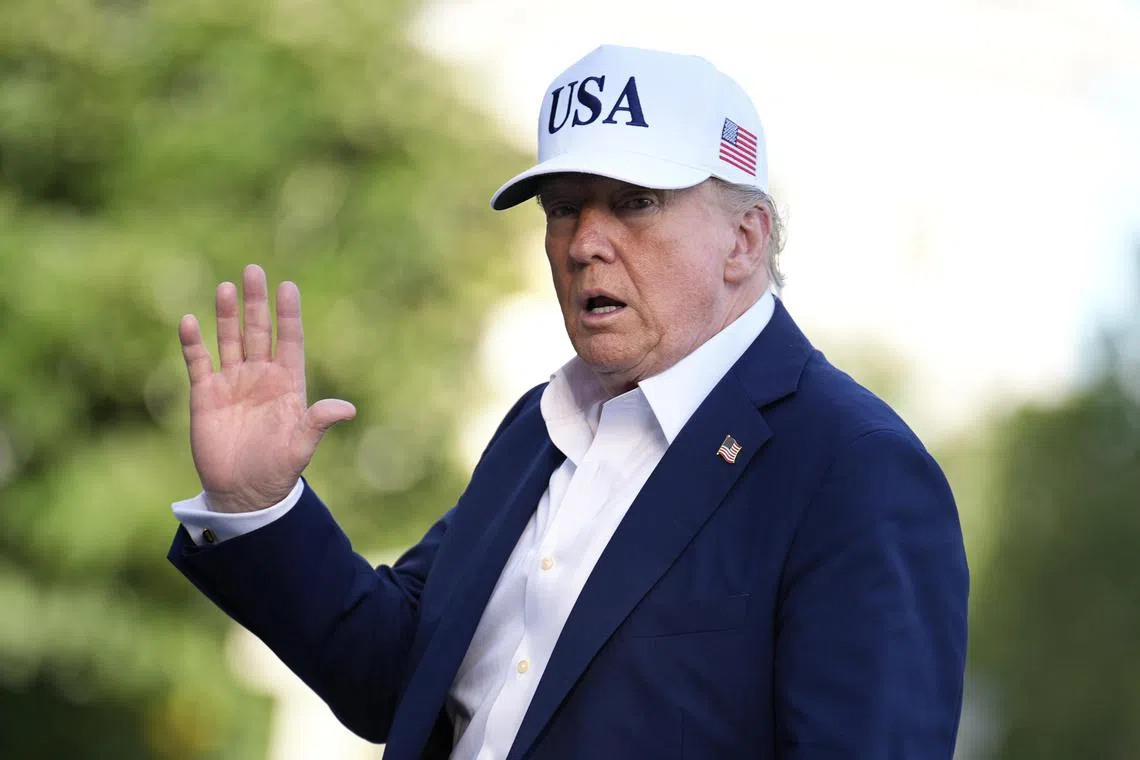Trump says US near trade deals as tariff effective date delayed
Sign up now: Get ST's newsletters delivered to your inbox

US President Donald Trump in April announced a 10 per cent base tariff rate on most countries and additional duties ranging up to 50 per cent.
PHOTO: EPA
Follow topic:
MORRISTOWN, New Jersey – The US is close to finalising several trade agreements in the coming days and will notify other countries of higher tariff rates by July 9, President Donald Trump said on July 6, with the higher rates scheduled to take effect on Aug 1.
Since taking office, Mr Trump has set off a global trade war that has roiled financial markets and sent policymakers scrambling to guard their economies, including through deals with the US and other countries.
In April, he unveiled a base tariff rate of 10 per cent on most countries and additional duties of up to 50 per cent, but later gave a three-week reprieve until July 9 for all but the 10 per cent.
Mr Trump, whose remarks to reporters on July 6 came just before his return to Washington from a weekend golfing in New Jersey, had flagged the Aug 1 date earlier, but it was unclear if all tariffs would increase then.
Asked to clarify, Commerce Secretary Howard Lutnick told reporters the higher tariffs would take effect on Aug 1, and that Mr Trump was “setting the rates and the deals right now”.
In a posting on his Truth Social website, Mr Trump later said the US would start delivering tariff letters from noon on July 7 (midnight on July 8, Singapore time).
In a separate post, he rolled out a wholly new tariff policy, calling for countries “aligning themselves with the anti-American policies” of the Brics developing nations to be charged an extra 10 per cent tariff
The first Brics summit in 2009 was attended by leaders from Brazil, China, India and Russia, with South Africa joining later, while Egypt, Ethiopia, Indonesia, Iran, Saudi Arabia and the United Arab Emirates (UAE) were included in 2024.
Mr Trump has close ties to leaders of some of those countries, such as Saudi Arabia and the UAE, and has been touting the prospect of a trade deal with India for weeks.
On July 6, Brics leaders condemned attacks on Gaza and Iran
It was not immediately clear, however, if Mr Trump’s tariff threat would derail trade talks with India, Indonesia and other Brics nations.
US Treasury Secretary Scott Bessent told CNN earlier on July 6 that several big announcements of trade agreements could come in the next days, noting that the European Union had made good progress in its talks.
He said Mr Trump would also send out letters to 100 smaller countries with whom the US does not have much trade, notifying them that they would face higher tariff rates first set on April 2 and then suspended until July 9.
“President Trump’s going to be sending letters to some of our trading partners saying that if you don’t move things along, then on Aug 1, you will boomerang back to your April 2 tariff level.
“So I think we’re going to see a lot of deals very quickly,” Mr Bessent told CNN.
Mr Kevin Hassett, who heads the White House National Economic Council, told CBS that there might be wiggle room for countries engaged in earnest negotiations.
“There are deadlines and there are things that are close, and so maybe things will push back past the deadline,” Mr Hassett said, adding that Mr Trump would decide if that could happen.
‘I hear good things’
Mr Stephen Miran, chairman of the White House Council of Economic Advisers, told ABC News that countries needed to make concessions to get lower tariff rates. “I hear good things about the talks with Europe. I hear good things about the talks with India.
“And so I would expect that a number of countries that are in the process of making those concessions... might see their date rolled.”
Mr Bessent told CNN that the Trump administration was focused on 18 important trading partners that account for 95 per cent of the US trade deficit.
But he said there had been “a lot of foot-dragging” among countries in finalising trade deals.
Mr Trump has repeatedly said India is close to signing a deal and expressed hope that an agreement could be reached with the EU, while casting doubt on a deal with Japan.
Thailand, keen to avert a 36 per cent tariff, is now offering greater market access for US farm and industrial goods and more purchases of US energy and Boeing jets, Finance Minister Pichai Chunhavajira told Bloomberg News on July 6.
India and the US are likely to make a final decision on a mini trade deal in the next 24 to 48 hours, local Indian news channel CNBC-TV18 reported on July 6, with average tariffs on Indian goods shipped to the US to be 10 per cent.
Mr Hassett told CBS News that framework agreements already reached with Britain and Vietnam offered guidelines for other countries seeking trade deals.
He said Mr Trump’s pressure was prompting countries to move production to the US.
Mr Miran called the Vietnam deal “fantastic”.
“It’s extremely one-sided. We get to apply a significant tariff to Vietnamese exports. They’re opening their markets to ours, applying zero tariff to our exports.” REUTERS

